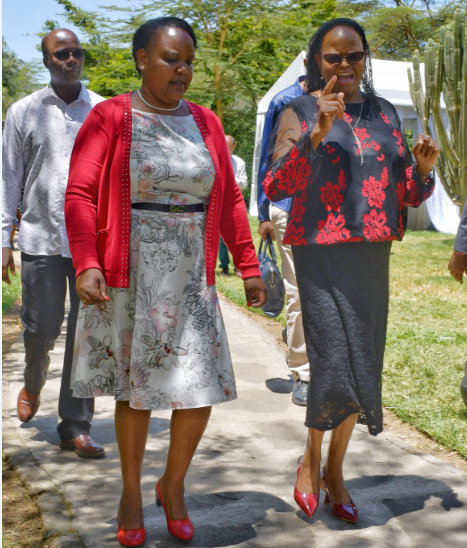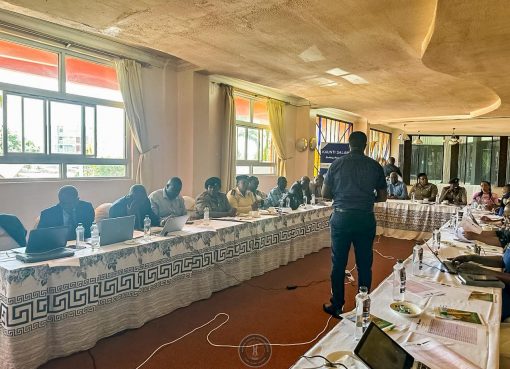The Chief Justice (CJ) and the President of the Supreme Court Justice Martha Karambu Koome has reiterated her concerns over low funding of the Judiciary which has in turn led to backlog of cases in courts.
Koome revealed that at the end of December 2023, the Employment and Labour Relations courts alone had 9,362 pending cases and out of these pending cases, 7,837 cases had been in court for more than one year.
“The challenge of backlog cases remains a pressing concern. With a considerable number of cases pending beyond a year, our shared goal must be to intensify efforts to reduce this backlog, ensuring timely justice for all parties involved,” the CJ said.
To this end, Koome said they are continuously engaging with the other arms of government to ensure that the Judiciary is adequately funded to implement these infrastructural aspirations.
The Judiciary was during the financial year (FY) 2023 / 2024 allocated a budget of Sh. 23Billion leaving a resource gap of Sh.19 billion which translates to 45 per cent of the total resource requirement for the FY 2023/24.
The CJ was speaking in Naivasha during the Annual Conference for Judges of the Employment and Labour Relations court.
Koome also voiced her opposition to the proposed Constitutional Amendment currently pending before Parliament that seeks to merge the two Specialized Courts of Equal Status with the High Court. Jurisprudence to the changing dynamics of the Workplace and the labour market.
She said she had already written to the leaders of Parliament, expressing the Judiciary’s position opposing the mixed-grill approach as proposed in the proposed constitutional amendments as not being the ideal.
“There was an informed reason why Kenyans during the constitution making process demanded for specialized attention to the areas of employment and labour relations, and also Environment and land and that rationale has not gone away. Moreover, the contribution by the two courts to expeditious delivery of justice and a robust jurisprudence in these areas of special concern to Kenyans justify the continued existence of the specialized courts,” the CJ noted.
Koome also commended the Judges of the Employment and Labour Relations courts for what she termed as dedicated and tireless performance that saw the courts reduce the backlog in their courts.
She added: “Your tireless efforts have propelled your courts to the forefront of excellence in service delivery, achieving the highest Case Clearance Rate across all courts. The Court’s progress in reducing the rate of adjournments is another achievement worthy of commendation. The rate of adjournments reduced from three per cent that was recorded the previous financial year, to an adjournment rate of 2 per cent of scheduled case events during the first half of this financial year. This reduction signifies a commitment to expediting the judicial process, further enhancing the court’s efficiency,”
The Chief Justice revealed that these courts had a Case Clearance Rate of 166 per cent during the first half of this financial year, meaning they had not only resolved a significant number of cases but also underscored its efficiency and commitment to reducing the backlog of cases.
Thus these Court resolved 3,414 cases while 2060 cases were filed before the Court during the first half of the financial registrar.
She observed that these Courts` jurisprudence as envisioned by the constitution had contributed to the social transformation and been instrumental in developing jurisprudence that not only addresses contemporary issues at the work place but also sets a benchmark for social Justice; from upholding the rights of marginalized and vulnerable groups to ensuring workplace safety, the court has made significant contributions that resonate with the social justice.
Koome reminded the entire judicial bench and officers that it was incumbent upon every member to foster an environment where integrity is the norm, not the exception, adding that this aligns with their overall aim to make what she called ‘judicial hygiene’ part of the judicial culture.
“Our goal has been that we should make ethics and integrity become second nature to our institution. We must therefore strive to live a life of integrity and encourage each other in this journey to aspire for higher standards of professionalism. It must start with each individual Judge affirming excellence in service delivery,” she advised.
The CJ assured the judges that despite the serious budgetary constraints that the judiciary operates under, she and her team were keen to support judges to ensure they work under a conducive work environment.
Cabinet Secretary, Ministry of Labour and Social Protection, Ms. Florence Chepng`etich Bore who graced the occasion said despite the achievements made in ensuring that justice is served in the labour sector, there is a backlog of unresolved cases and advised on the use of Alternative Disputes Resolution.
To this end, the CS said the Court Annex mediation has been particularly useful in restoring peace and order in the labour sector and therefore there was need to enhance our efforts towards this direction.
Ms. Bore said consequently, her Ministry will soon hold a Social Dialogue forum with stakeholders to explore ways and means to achieving the desired results especially within the Pre-court process.
“It is imperative that we address existing hurdles urgently to ensure that citizens are not denied their constitutional right to access justice and I propose a collaborative effort involving my Ministry, the Office of the Attorney General, the Judiciary, the Office of the Director of Public Prosecutions and other key stakeholders to develop a comprehensive work plan aimed at resolving the gridlock and expediting the resolution of pending cases,” the CS said.
She noted that by working together, leveraging the collective expertise and resources, Kenya can overcome this challenge and restore the integrity and effectiveness of our judicial system.
Bore said the labour sector was at the throes of a new age in industrial development and the change in the World of Work is enormous in terms of the changing nature of Work, Place of Work and Worker.
“The types of employment, organization of work and employment relationships are quickly evolving and there is no doubt there is a need to adjust the Legal Framework for promotion of justice, equity and industrial peace and harm are at the throes of a new age in industrial development,” the CS observed.
She added that we must defend and promote labour rights in platform work, remote working and in other typical forms of work arrangement and our laws need to accommodate all workers without difference and to ensure that all workers are afforded dignity, security and fair treatment.
The three – day conference is also being attended by Justice Smokin Wanjal; Director General of the Kenya Judiciary Academy, President of the Court of Appeal; Justice Daniel Isokolo Musinga and Chief Executive Officer (CEO), Federation of Kenya Employers (FKE), Ms. Jaqueline Mugo, the Principal Judge of the Employment and Labour Relations Court, Justice Byram Ongaya and Registrar of the Employment and Labour Relations Court Kennedy Kandet among others.
By Mabel Keya-Shikuku





